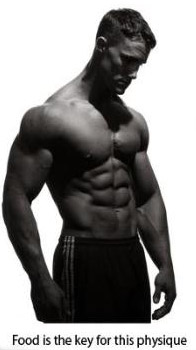Resources
Bookmark or Share this page
Gaining Lean Mass
For weight gain - “calories” (yawn!), must be above maintenance or “more than is required to keep your weight stable”.
This is not only because the physical act of weight lifting is energy intensive, but the subsequent repair process (hypertrophy) during the following rest requires a high amount of energy in order to happen. (Plus, your new muscle mass will require more calories to exist than your previous un-lean mass did. Happy days!)
The Truth of the matter is: If you weight train hard all week, yet fail to eat enough, you will not see an increase in size or an improvement in body composition.
If you’re male and your current bodyfat levels are between 13-18%, you can find your approximate daily calorie expenditure (the amount your body requires to lie down and breathe for 24 hours) by multiplying your total bodyweight in lbs by 10.
Eg: 14 stone male would come out somewhere around 2200 calories per day just to exist.
Now we need to factor in your activity. According to a formula discovered during sports research, and assuming our example male is “moderately active”, the daily calorie requirements now rise to as many as 3500 per day!
Don’t get excited!
3500 calories of ice-cream, pizza, Doritos and chippy chips obviously won’t have the same effect as 3500 calories of clean-eatin’. (However, if you happen to like ice-cream, pizza, crisps and chips – I have clean, muscle building versions of each one! ;-) )

For muscle growth, aim for at least 1g of good quality lean protein per lb of bodyweight
eg: 14 stone male = approx 200lbs
so aim for minimum 200g lean protein per day.
Each gram of protein contains 4 calories, so your total protein content will be accounting for 600 calories per day from your diet. Now you need to fill the remainder of energy needs with clean carbohydrates (oats, grains, brown rice etc) and healthy fats (mono and polyunsaturated, omega 3 and 9 and some saturates.
All of these are important. You should also be eating plenty of vegetables, salad and fruit in order to get the most out of your gains. Vitamins and Minerals play a key part in food absorption and energy generation from food, not to mention muscle micro-damage control – without, your results will be less spectacular. Now, there is a huge gap between your 600 protein calories and your 3500 total calories, and so there is a large margin for macronutrient manipulation. If you want the majority of your weight gain to be LEAN (muscle, not fat), you need to get specific advice and a tailored diet for your needs.
Or try trial and error using the numbers and suggestions provided here. Your protein intake needs to be regular, as research proves the body is able to absorb a maximum of around 40-50g of protein at any one time. Also, your body has no storage capacity for protein like it does for carbohydrates (where it is stored in the liver and inside muscle tissue) and fats (on your love handles) so a drip-feed approach to protein intake is ideal.
Aim for between 6-9 mini meals throughout the day. Try not to go for more than four hours without food. Divide your daily calorie requirements by the number of meals you can fit around your schedule to find your portion sizes. Eg: 3500total daily cals / 8 daily meals = 440 calories per meal.
Animal Protein - complete proteins, high protein content, high Biological Value (absorption rate).
Dairy Protein – complete proteins, lower protein content (unless isolated), high Biological Value.
Vegetable Protein – often incomplete proteins, lower protein content (unless isolated), lower BV.
Egg white protein is considered to have one of the best amino acids profiles for human nutrition.
Soy protein is one of the best plant proteins, but has questionable effects on undesirable hormone levels (male estrogen = moobs!)
So, you’re looking to get highly absorbable protein first thing in the morning.
Example Daily Intake:
Meal 1:
Scrambled eggs are great because you can eat as many as six whole eggs and not really notice. (440 cals, 38g protein) toss in some tomatoes, spinach and oats and you get some slow release carbs, vitamins, minerals, calcium and iron along with a few more grams of protein to bump you up to a nice round 40g intake for meal one.
Meal 2:
You’ll need a few snacks throughout the day. Tuna is handy, beef jerky is convenient. (ask me for more ideas!)
Meal 3:
Lunch – I generally recommend seeing lunch as an “midday evening meal” and eat accordingly.
Meal 4:
Another snack. Perhaps some nuts, cheese or chorizo. Maybe some fruit.
Meal 5:
Evening meal – Meat and Two veg style! If you’re lokoing to gain mass you need some carbs here too. We’ve covered 5 meals by now, your next two should be timed before and after your workout.
Meal 6:
Pre-workout you’ll need fuel for your workout. If you train for longer than 30 minutes you’ll want a large dose of protein in a highly absorbable form, but will probably not want a heavy meal in your stomach. Protein shakes are ideal.
You’ll also need plenty of slow release carbs for energy and power to last over 30 mins (especially on leg days and for any cardio). You can get carbs in liquid or solid form to suit your preference.
Meal 7:
Post-Workout is THE most important. You need protein, and you need fast release carbs to shuttle the protein into your glycogen depleted muscles, and you need this within 20-30 minutes of finishing up for best results.
Meal 8:
Before bed (especially if you train late at night) you’ll want a slow release protein and a slow release carb OR a healthy fat to take your repair process through the night. Casein is a form of protein derived from milk but is much slower to digest than whey. It’s a great choice for bedtime, and will benefit the body during sleep by helping to prevent catabolism. You’ll find it in cottage cheese and casein based protein powders.

